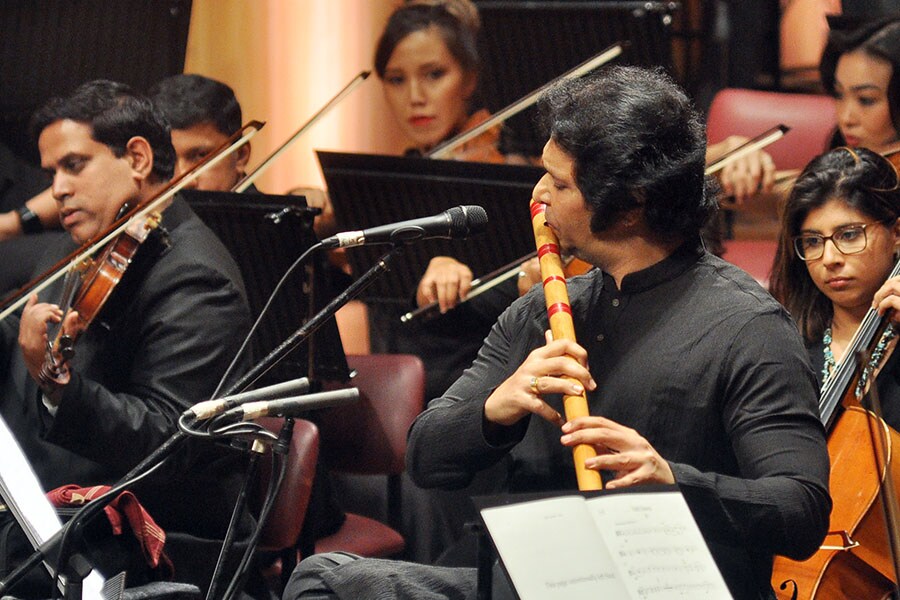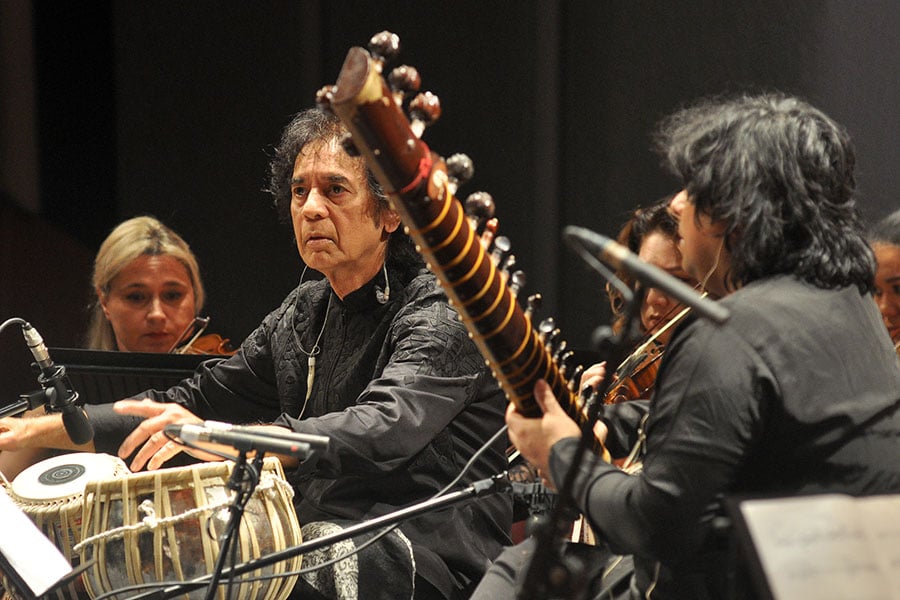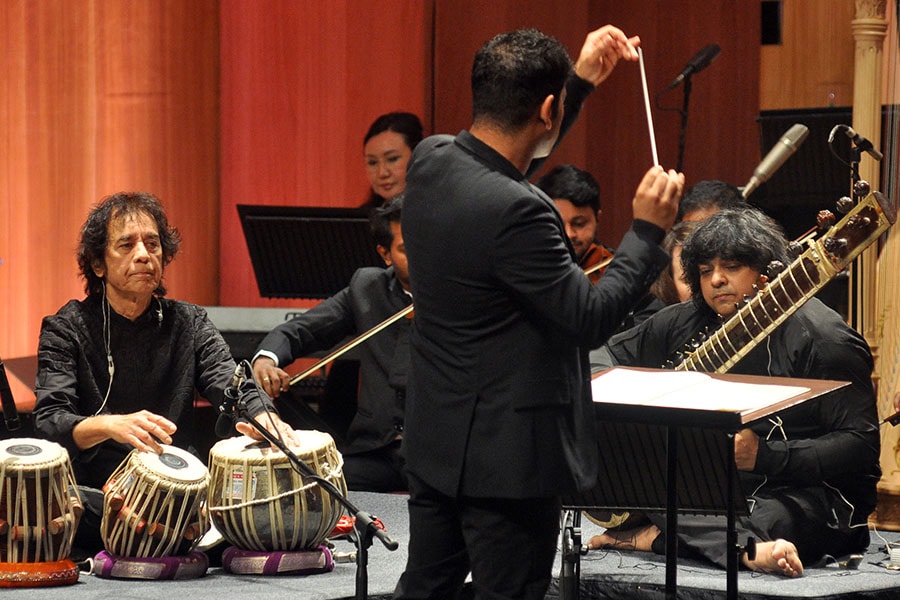Hussain, who started playing professionally since he was 12, doesn’t just make such assertions through his words, but also through concerts that run full houses all over the world, proving time and again that the Indian classical school has a robust following. A case in point would be his recent performance at the National Centre for Performing Arts (NCPA) in Mumbai, the world premier of a triple concerto (of the tabla, sitar and flute) that he composed for the Symphony Orchestra of India (SOI), which sold out in three days. “The presumption that this music is not being heard or seen is because you, as the media, have not had the time to be able to see if it has or not," he says.
I had no problems thinking of melodic structures to create. But, at the same time, if you look at the chart, it says in the score that the flute and the sitar will interpret this as they desire at the moment. In other words, they may play it in the rehearsal in a certain way, but they may twist it around a tad more in the concert. And then, in the next concert, it may even morph into something more hybrid. To have these two musicians there allowed me that luxury. It didn"t matter if I was writing a raga, it did not matter that the symphony orchestra was interpreting the notes allotted in that raga in a more harmonic way. I had no problems with the orchestra throwing all those harmonic elements at them because I knew they will find a way to be able to dress whatever that they are presenting in the kind of outfit needed to fit it with the orchestra.
Q. In terms of writing, how different has it been from Peskhar, the tabla concerto that you composed for the SOI in 2015?
Hussain: The Peshkar—the tabla concerto that I wrote—was out and out a rhythm concerto. There was not as much emphasis on the melodic element, but instead the attempt was to get the orchestra musicians to actually become tabla players and play tabla on their various instruments.
The fun for me at that time was to take all these beautiful compositions of tabla, look at it in a way as if more than one person was playing it. So, if more than one person was playing it, how would I divide parts of that particular composition? Then, I would do that first—divide its rhythmic syllables in the different ways that they will go, and then assign it to the instruments—how the violins would do it, how the cellos would do it, how the horns will do it, so on and so forth.
But this time, for me, a tabla player with a limited understanding of melody, it was the need to be able to rely upon these two gentlemen to magnify a thousand-fold this tiny little idea that I, within my limited capacity, was able to conjure up. Alongside, there were two gentleman who helped me with this, who are well-conversed in both Indian and Western classical music—Neelamjit Dhillon, a saxophone and bansuri player and who also has a PhD in Western classical music, and cellist Chris Votek. They sat with me and suggested how the melodic harmonic counterpoints, syncopations, etc will work so as to maintain the integrity of those ragas that are in play and also allow melodic elements to improvise spontaneously and that the orchestra had in front of them material that, no matter the improvisations, will work well together.
Q. Niladriji and Rakeshji, how was it for you to play with a Western classical orchestra?
Niladri Kumar: Usually when a composer writes a symphony for Indian classical instruments and an orchestra, s/he is also seen performing with the orchestra, whether it was in the case of Pandit Ravi Shankarji or many others after that. But it’s different this time, and, for me, it is a learning process.
And it’s a completely different experience from playing in a Bollywood orchestra, because there, you"re not really interacting with the orchestra as such. Everything is written down and you"re almost playing individually and separately at times—since it’s all digital, live-playing with the orchestra is almost redundant. So, this concerto is a learning curve.
The writing of this symphony is where its soul lies. Because he [Zakir Hussain] is so well versed with both the traditions in the nature of how those work. The spaces that have been kept, including with the bars that are fixed, are open. If you see the notation, there are open spaces which will be interpreted differently at every concert.
![]() Flautist Rakesh Chaurasia feels despite its exclusivity, Indian classical music has reached different corners of the globe, thanks to artistes like Hussain. Image: Courtesy NCPA
Flautist Rakesh Chaurasia feels despite its exclusivity, Indian classical music has reached different corners of the globe, thanks to artistes like Hussain. Image: Courtesy NCPA
Q. Given the complexities involved, how long did it take for you to come up with the concerto?
Hussain: The main thing was that it took me a long time to psychologically accept the consequences of it. You"re messing with traditions and there are gatekeepers on both sides who may not take kindly to it. But then, I looked at myself in the mirror and said it doesn’t matter—if I have to bear the brunt of somebody"s anger, then so be it.
I started with melody—I had these three different melodies for three different movements, and built each movement around that one melody. This is a process I learnt from a very dear friend of mine [acclaimed American bassist] Edgar Meyer, who has also performed with the SOI. He introduced me to the way Bach, the great composer of yesteryears, would write a 20-minute movement consisting of just one melody. But through those 20 minutes, that melody would become so many different melodies, and it would assume so many different shapes and forms, and adorn so many different colours that it would feel like one new melody after another was constantly appearing.
Q. You’ve been a master of bringing together different genres of music for decades. You were one of the co-founders of fusion band Shakti in 1973, which completed a golden jubilee this year. What does the band mean to you?
Hussain: Just about five days ago, we finished our 50th-year tour in America. Shakti as a band or my relationship with [celebrated guitarist] John [McLaughlin, one of the co-founders] shaped who I am, what I ended up being. If I had not run into him, or a couple of other musicians like Mickey Hart [drummer with Grateful Dead] or George Harrison [lead guitarist with the Beatles], I may have just been an Indian classical musician living in India, playing the tabla. I may not have had such a wing span, such visibility that I have now and an understanding of music as a universal statement. Playing with John has changed the trajectory of where I was headed and the kind of joy, the unlimited happiness that we felt playing with each other hasn’t dimmed 50 years down the road. In fact, it has only magnified. I have to credit my relationship with John in many ways that has helped design who Zakir Hussain is, and that’s what Shakti means to me.
Q. Indian classical music is perceived to be niche and a bit elitist. How do you think it can be taken to wider audiences?
Rakesh Chaurasia: It has already reached every corner of the world because of artistes like Zakir Hussain, but I don’t think it really needs to reach a mass level because it’s a classical thing. It has to be a little exclusive. What we do cannot be enjoyed the way you can do with Bollywood music—crowded arenas, open spaces, and dew spoiling the sound of the instruments.
Hussain: As far as I"m concerned, the idea that Indian traditional music is wallowing in some kind of invisible mist and that it"s not being heard or seen—I do not agree with that. I feel it has thriving audiences all over the world. It"s one of the prominent forms of music in the world, like Western classical, jazz, rock, pop. And it didn"t arrive at that point by living in obscurity. The case in point is these gentlemen are so busy constantly playing concerts all over the world.
I have to say the Bollywood or pop cultural musicians, when they come to Europe and America, sit around on Mondays, Tuesdays, Wednesdays, Thursdays twiddling their thumbs, and then they play a concert on Fridays, Saturdays and Sundays. And then they sit around again on Mondays, Tuesdays, Wednesdays and Thursdays. Indian classical musicians, on the other hand, have an audience that is willing to come and hear them on any day of the week.
![]() Zakir Hussain, who has collaborated with musicians across generations and genres, believes the key to a successful collaboration lies in the mindset of collective performance. Even in this concerto, he has left space for Kumar and Chaurasia to interpret parts of the score. Image: Courtesy: NCPA
Zakir Hussain, who has collaborated with musicians across generations and genres, believes the key to a successful collaboration lies in the mindset of collective performance. Even in this concerto, he has left space for Kumar and Chaurasia to interpret parts of the score. Image: Courtesy: NCPA
Q. So Indian classical music has its own place, a steady following.
Hussain: I"ve seen concerts where Indian pop artistes are playing in the same city at the same time as us and yet we have a full house. The pop artistes, doesn"t matter where they are travelling in the world, will attract Indians who have grown up with that music Indian classical music, on the other hand, will attract a whole variety of discerning and diverse audience.
Indian classical music has a solid following which, I believe, has only grown in the past 50-60 years gradually. And when something grows gradually, it means that it"s not a fad, that it has staying power. If you have one hit song, and no other hits for the next two years, people forget you and you"re done.
Chaurasia: But I wonder why this question always comes up—whether Indian classical music has a future.
Hussain: You know why? Because Indian classical musicians do not appear on page three.
Kumar: Actually, the question could be, what is the future of film music? What do you think is the future of singers with all the talent shows? It"s a question that nobody"s asking because it"s so visible, and you feel it’s thriving. What you don"t see every day when you open the newspaper is an Indian classical artiste. Hardly ever.
Hussain: Our PR is a niche PR, our visibility is niche, in an area the media, sadly, either does not have access to or does not have the time to access. So the presumption is all this music is not being heard or not being seen because you, as the media, have not had the time to be able to see if it has or not. Therein lies the problem.
Indian classical music is doing well, it is thriving, but it is wrong to consider it to be a stadium-oriented music. And, therefore, it attracts the kind of people who are quite happy with not having to worry about 50 posts a day on Instagram or X [formerly Twitter]. The idea of comparing Indian music to popular music is the first hurdle that you have to cross as an interviewer. And when that happens, everything will sit in their proper places.
![]() Sitarist Niladri Kumar says this concerto is a learning curve for him since it"s a novelty to play a composition live with an orchestra. Image: Courtesy NCPA
Sitarist Niladri Kumar says this concerto is a learning curve for him since it"s a novelty to play a composition live with an orchestra. Image: Courtesy NCPA
Q. You’ve collaborated with generations of musicians, from the likes of Pandit Ravi Shankar to now with Niladriji and Rakeshji, and also across genres—with George Harrison, Van Morrison, Grateful Dead. What is the thumb rule of a great collaboration?
Hussain: The mindset that we are playing music, and not different music. I will do whatever it takes for me to be able to put on the table that which makes sense in the composition. I"m not going to say, “Oh, I’m Zakir Hussain, and I am only going to do North Indian classical with tabla." If I arrive with that mindset, I’ve already created a barrier. If one of us goes for an interaction with John McLaughlin or Sting, and ask, the first time they play a melody, ‘What raga is it?’, we’ve already created a barrier and brought into play many dos and don’ts.
And it not only applies to collaboration and different genres of music, but also to Indian classical music. If I have to play with him, I must be willing to do whatever it takes for us to have a valid conversation on the stage. If I am going to assert my Zakirness on Rakeshji, we cannot have a musical conversation.
Q. Over six decades of performing on the stage, what are some of your most abiding memories?
Hussain: I thank the powers that be that I"ve been in the presence of people who have meant so much to me. Hariji [Pandit Hariprasad Chaurasia], among others, has been a special guide to me so has Shivji [Pandit Shiv Kumar Sharma], who passed away recently. Having a 40-year relation with them is a blessing I do not consider myself worthy of, but I thank my lucky stars that I am being blessed with it.
I have memories of riding a three-wheeler from Kolhapur to Miraj with Hariji, or with my tablas in a cycle rickshaw in Lucknow, going to a concert, or my father [Ustad Alla Rakha] jumping up on stage at St Xavier’s College, hugging me and putting a garland around my neck because they announced I just got a Padma Shri… these are moments that are etched in my memory. There are so many of such personalities—Mickey Hart or [Egyptian composer] Hamza El Din or sitting with [percussionist] Airto Moreira in his village in Brazil among the shaman priests. These memories have been special and I hope it"s miles to go before I sleep.
Q. In this period, you also brought the tabla to the mainstream, from being an accompanying instrument.
Hussain: You have to thank the ones who went before us. Pandit Ravi Shankar, Ali Akbar Khanji, my father Ustad Alla Rakha, Chatur Lalji, who all went forward and set the platform up. Especially for tabla players who were secondary citizens in Indian music, the likes of my father, Samta Prasadji, Pandit Kishan Maharaj, brought attention to the instrument and set the launching pad for someone like me to bounce off and take flight.
[Even now] when you think of tabla, don"t just think of Zakir Hussain—there are about 15 other players who are just as good as me or, on their day, even better. Indian classical music has a better bench strength than the Indian cricket team. And there are a bunch of musicians who are waiting to be noticed. And maybe this is why you haven"t heard of Indian music well enough because you haven"t paid attention to them.



